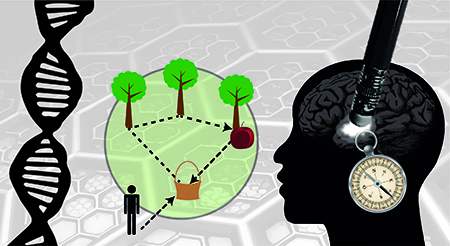Editor: Axmacher N., Springer; 1st ed. 2023 Edition (2. August 2023)
This book offers the first, comprehensive guide to planning and conducting intracranial EEG studies, and analyzing intracranial EEG data. The chapters address core questions in the field of intracranial EEG research. They are written by internationally recognized experts in the domain of intracranial EEG and acknowledge the heterogeneity of approaches in this field. The particular format of the book allows readers to find clear guidelines, hands-on expertise and invaluable background information for planning and conducting state-of-the-art intracranial EEG research projects. Besides offering a reference guide to newcomers in the field, it also provides scholarly information for the more experienced researcher and inspiration for the expert. The book covers a wide range of topics, with a special emphasis on aspects in which intracranial EEG data differ from other types of data in the cognitive neurosciences. It discusses typical patient characteristics and implantation schemes, ethical issues, and practical considerations for planning and running intracranial EEG experiments. It addresses signal characteristics and the physiological background of oscillatory and non-oscillatory aspects of intracranial EEG signals. It describes complex pre-processing steps such as advantages and disadvantages of different referencing schemes, and how to identify the location of electrodes. In addition, it answers specific questions on data processing, addressing core aspects of statistical analysis, and suggesting guidelines for data presentation. Further, it covers advanced topics such as causal interventions (i.e. deep brain stimulation), acquisition and analysis of single-unit data and multimodal recordings, and discusses important future challenges and opportunities in the field of intracranial EEG research.

Participants in the Trier Social Stress Test are subjected to stress in a simulated job interview in front of a committee with neutral expression (see image).
© Institut für Kognitive Neurowissenschaft, Anne Bierbrauer
Bierbrauer A, Fellner MC, Heinen R, Wolf OT, Axmacher N
When the brain stores memories of objects, it creates a characteristic pattern of activity for each of them. Stress changes such memory traces.
Stressful experiences are usually remembered more easily than neutral experiences. Researchers at Ruhr-Universität Bochum (RUB) have analysed the reasons why this is the case. They put people in stressful situations during simulated job interviews and then recorded their memory of objects from these interviews. Using functional magnetic resonance imaging, they analysed brain activity while the participants saw the objects again. Memories of objects from stressful situations seem to rely on similar brain activity as memories of the stress trigger itself.

In the ninth episode of our podcast “Kannste vergessen?”, Rainer Holl goes on a mental journey to a very special region of the brain: the hippocampus. His travelling companions? Two experienced scientists who have been researching this at the Ruhr University for years: Nikolai Axmacher, Professor of Neuropsychology and Sen Cheng, Professor of Computational Neuroscience.
In this episode you will learn…
…what the hippocampus is, where it is located in the brain and what its tasks are
…what different formats a memory can have
…how different contexts can affect the performance of the memory
…how traces of experiences can be traced in the brain
…how complex, neuronal networks can be simplified and better studied with mathematical models and computer simulations
…what role AI and robots play in this process …and much more.
https://podcast988584.podigee.io/9-hip-hipper-hippocampus
How can genes be switched on and off? For the fifth episode of our podcast “Kannste vergessen?”, Rainer Holl welcomes Robert Kumsta, Professor of Genetic Psychology at the Ruhr University in Bochum. Look forward to a crash course in epigenetics!
In this episode you will learn…
…what epigenetics actually is
…how epigenetic mechanisms work
…which environmental influences and psychosocial experiences can interact with cellular processes
…how early developmental phases have a lasting impact on our epigenome and thus on our life, our health, our behavior in adulthood
…and much more.

An essential mechanism memory is not only to remember relevant information, but also to forget irrelevant information. Whether forgetting, i.e. selective inhibition irrelevant information, is an active process, or a mere byproduct of omitted rehearsal remained debated. Here, using EEG and multivariate analysis methods we find clear evidence that humans employ active inhibition mechanisms to attenuate memory traces in oder to voluntary forget unwanted information“.
Fellner MC, Waldhauser GT, Axmacher N.

Alzheimer’s patients develop severe symptoms of spatial disorientation as the disease progresses and are unable to find even the simplest ways. An international research team headed by Anne Bierbrauer, Dr. Lukas Kunz, Dr. Carlos Gomez and Professor Nikolai Axmacher from Ruhr-Universität Bochum and Universitätsklinikum Freiburg now reports that problems in spatial navigation can also be detected in people with a genetic risk for Alzheimer’s. Their article was published in the journal Science Advances, released online on 28 August 2020. The team from Bochum, Freiburg, Dortmund, Sevilla, Madrid, Parma and Brussels explored the ability of path integration.
Bierbrauer A, Kunz L, Gomes CA, Luhmann M, Deuker L, Getzmann S, Wascher E, Gajewski P, Hengstler JG, Fernandez-Alvarez M, Atienza M, Cammisuli DM, Bonatti F, Pruneti C, Percesepe A, Bellaali Y, Hanseeuw B, Strange BA, Cantero JL, Axmacher N. Science Advances, Vol. 6, no. 35, eaba1394 DOI: 10.1126/sciadv.aba1394 Pressemitteilung